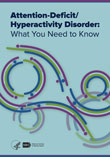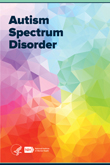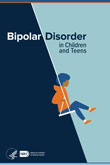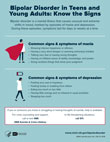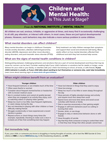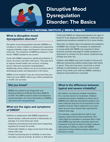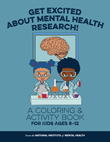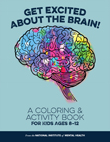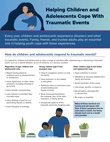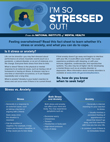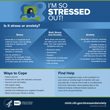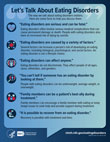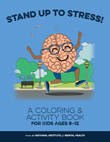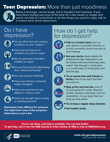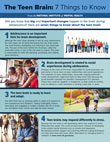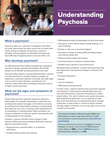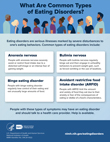Publications about Children and Adolescents
- Attention-Deficit/Hyperactivity Disorder: What You Need to Know
-
Information about symptoms, diagnosis, treatment, and resources for children, teens, and adults with attention-deficit/hyperactivity disorder (ADHD).
- Autism Spectrum Disorder
-
Describes autism spectrum disorder (ASD): signs and symptoms; causes and risk factors; diagnosis in children, teens, and adults; and treatments.
- Bipolar Disorder in Children and Teens
-
Information about bipolar disorder in children and teens including causes, signs and symptoms, diagnosis, treatment options, and how to help.
- Bipolar Disorder in Teens and Young Adults: Know the Signs
-
This infographic presents common signs and symptoms of bipolar disorder in teens and young adults.
- Children and Mental Health: Is This Just a Stage?
-
Information on children’s mental health including behavioral assessments, when to seek help, treatment, and guidance on working with your child’s school.
- Disruptive Mood Dysregulation Disorder: The Basics
-
Information about disruptive mood dysregulation disorder, including a what it is, signs and symptoms, diagnosis, treatment, and tips for parents and caregivers.
- Get Excited About Mental Health Research!
-
This printable coloring and activity book for children ages 8-12 has information about mental health research and paths to becoming a mental health researcher.
- Get Excited About the Brain!
-
This free science education activity book helps kids ages 8-12 learn facts about the brain with coloring and puzzles about brain science and research.
- Helping Children and Adolescents Cope With Traumatic Events
-
This fact sheet presents information on how children and adolescents respond to traumatic events, and what family, friends, and trusted adults can do to help.
- I’m So Stressed Out! Fact Sheet
-
This fact sheet is intended for teens and young adults and presents information about stress, anxiety, and ways to cope when feeling overwhelmed.
- I’m So Stressed Out! Infographic
-
A brief social media graphic about stress, anxiety, and ways to cope when feeling overwhelmed.
- Let’s Talk About Eating Disorders
-
This infographic presents facts that can help shape conversations around eating disorders.
- PANDAS—Questions and Answers
-
Information about causes, symptoms, diagnosis, and treatment of Pediatric Autoimmune Neuropsychiatric Disorders Associated with Streptococcal Infections.
- Stand Up to Stress!
-
This free coloring and activity book helps kids learn simple ways to manage stress and boost their mental well-being.
- Teen Depression: More Than Just Moodiness
-
This fact sheet is intended for teens and young adults and presents information about how to recognize the symptoms of depression and how to get help.
- The Teen Brain: 7 Things to Know
-
Learn about how the teen brain grows, matures, and adapts to the world.
- Understanding Psychosis
-
This fact sheet presents information on psychosis including causes, signs and symptoms, treatment, and resources for help.
- What Are Common Types of Eating Disorders?
-
Information about eating disorders, including anorexia nervosa, binge-eating disorder, bulimia nervosa, and avoidant restrictive food intake disorder (ARFID).
